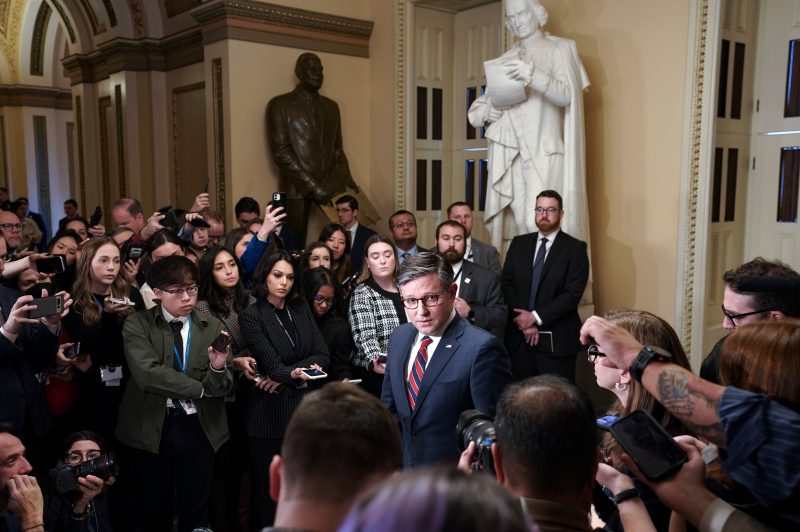House Republicans crossed a threshold Wednesday in their investigations of President Biden, voting to formalize an impeachment inquiry authorized by the previous House speaker.
If the GOP wasn’t committed to the exercise before — which you could be forgiven for thinking, given that it’s been 2 ½ months since their initial hearing — it surely is now.
As for whether this is a politically sound decision, the jury is out. The exercise appears to be forged on shaky ground — not just regarding evidence but also public opinion.
Polling has shown that Americans are quite skeptical of Hunter Biden’s foreign business dealings and are even inclined to believe that he was given preferential treatment in his legal case, which has resulted in increasingly serious indictments. Americans also generally believe that President Biden had some kind of proximity to his son’s business dealings; in a CNN poll, as many as 6 in 10 wagered that the president was involved in them.
As for whether they think he did anything wrong that warrants impeachment or even just an inquiry? They’re far less sold.
The key numbers:
Support for this impeachment inquiry continues to come up shy of the support both of Donald Trump’s had. Majorities generally supported Trump’s early on, with support sometimes in the high 50s and outpacing opposition by double digits. A Marist College poll released Tuesday showed Americans were split on the Biden inquiry. And a late-October AP-NORC poll showed Americans disapproved, 39 percent to 33 percent.Comparatively few Americans believe Biden broke the law. In the AP-NORC poll, 35 percent of Americans said he broke the law, while 40 percent said so in an October Fox News poll. Trump was generally in the mid-40s on this measure during his impeachments, and he has been around 50 percent when it comes to his recent indictments.CNN’s October poll showed that 57 percent said Biden shouldn’t be impeached and removed from office — which is between 10 and 14 points higher than in CNN polls of Trump’s impeachments.Perhaps most inauspiciously for Republicans, those who say they’ve actually consumed news about the inquiry were significantly more opposed to it. The AP-NORC poll showed that among the approximately half of voters who had read or heard something about impeachment, they disapproved of the inquiry 49 percent to 31 percent.
None of that means people won’t ultimately be convinced. The fact that people are inclined to believe that the president was involved in Hunter Biden’s business deals suggests they could be. And 60 percent-plus have told both CNN and AP-NORC pollsters they think President Biden at least did something unethical.
Republicans have come up far shy of a smoking gun in the case, hyping a series of disclosures and conclusions that weren’t as advertised or were undermined by other evidence. And that’s after they’ve focused on the subject for years, dating back to Trump’s presidency, which suggests there simply might not be enough there there.
Which brings us to the other gamble here. And that’s what happens next, particularly when it comes time to actually impeach.
The GOP mustered the votes for the inquiry Wednesday despite their narrow majority, launching it purely along party lines with all 221 Republicans voting in favor. They won the votes of Republicans who had previously expressed skepticism or even outright opposition to a mere inquiry.
But some in their ranks are still making clear that they don’t believe the evidence is there for actual impeachment. Rep. Ken Buck (R-Colo.) suggested that his colleagues were engaging in “retribution impeachments,” while Rep. Don Bacon (R-Neb.) said Biden had “probably not” committed an impeachable offense.
Partisanship might ultimately win the day; there have been no major pieces of new evidence actually linking Biden to wrongdoing since those members expressed opposition to an inquiry months ago, and those members still went along. The pressure to toe the party line is strong.
But Republicans might face the reality of being able to lose only two or three votes when the situation comes to a head. If members such as Buck and Bacon or vulnerable House Republicans can’t be persuaded, the whole thing could get dicey.
(You would think the decision to launch would mean GOP leaders are confident they’ll ultimately be able to impeach. But their handling of this process hasn’t exactly gone smoothly; in addition to the lack of public hearings after a rough initial one, then-Speaker Kevin McCarthy promised that the inquiry would launch with a vote — shortly before launching it without one, seemingly in part because the votes weren’t there.)
If the poll numbers don’t move significantly toward where they were for Trump’s impeachments (and are now for his indictments), a Biden impeachment vote could be tricky for a lot of Republicans — and for GOP leadership. And failing to even hold a vote would be a remarkable capitulation.
Republicans have effectively created the expectation with their base that they’ll ultimately be able to get it done. Now comes the hard part.

